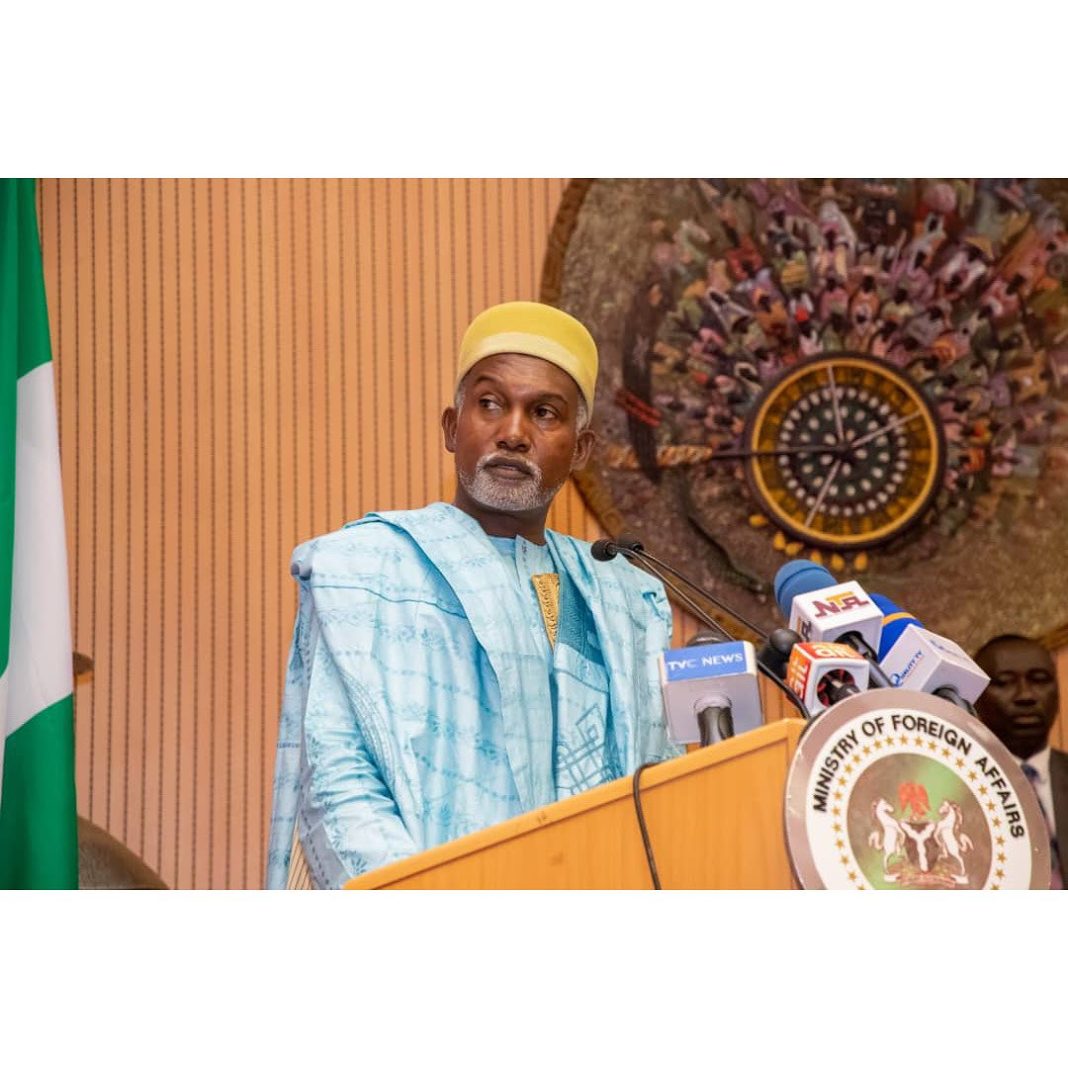By Bashir Aliyu
Yusuf Maitama Tuggar, a seasoned diplomat and visionary leader, has been at the forefront of several strategic initiatives that have bolstered Nigeria’s position on the global stage since President Bola Ahmed Tinubu came to power in 2023. With a wealth of experience in international relations and a strong track record of effective diplomacy, the veteran diplomat has played a pivotal role in shaping Nigeria’s foreign policy agenda and spearheading initiatives that have enhanced the country’s diplomatic standing in the community of nations.
As Nigeria’s Ambassador to Germany, Tuggar leveraged his strategic vision to strengthen economic ties between the two nations which allowed Nigeria to bank on Germany for energy and security partnership. Recognizing the importance of trade and investment in fostering bilateral relations, Tuggar actively promoted Nigeria as an attractive destination for German businesses, an achievement that led to improved electricity supply in Nigeria. Through targeted initiatives and diplomatic engagements, he facilitated increased trade flows, attracting German investors to key sectors such as agriculture and energy. Tuggar’s efforts not only led to a surge in German investments in Nigeria but also enhanced the country’s reputation as a business-friendly destination.
Moreover, Tuggar’s strategic initiatives since he took over Nigeria’s Ministry of Foreign Affairs, have have gone beyond the prism of economic diplomacy or our fixation with Africa as the centerpiece of our foreign policy to prioritize democracy, development, demography and diaspora, a new doctrine being popularized as the Tinubu’s Doctrine. Known for his soft diplomacy when it comes to protecting the interest of Nigerians abroad, Yusuf Maitama Tuggar has spearheaded a number of initiatives that are sure to promote and enliven Nigerian culture, art, and music around the world . Through cultural showcases, exhibitions, and collaborations. Tuggar is also leading a proactive effort to enhance people-to-people connections among Nigerians abroad with a view to ensuring Nigerians continue to excel and reposition the country as a home to the most talented people in Africa. This foreign policy direction will, in the long run, help to dispel stereotypes and misconceptions, promoting a positive image of Nigeria and its people.
Building on his success in Germany, Tuggar’s strategic vision and diplomatic dexterity were further demonstrated when ECOWAS got embroiled in geopolitical crisis following a series of coups in Burkina Faso, Mali and Niger which hampered and degraded the region’s capacity to fight off the scourge of terrorism which dramatically reached an apogee when ECOWAS imposed punitive sanctions on the countries. Tuggar recognized the strategic importance of these countries to Nigeria and ECOWAS as a whole in terms of national security, and the minister worked tirelessly to leverage these crises to ensure the instability in the Sahel did not pose an existential threat to Nigeria given the fact that Niger is a vital buffer against Jihadist elements in North Africa. In spite of the diplomatic standoff between the militaries authorities of these countries, Nigeria led a diplomatic offensive to douse the tension in return for a promise to return them into a fold of democracy which is a vital interest of Nigeria. A success which obviated the need for military action as a solution.
Additionally, Tuggar’s diplomatic initiatives on the global stage encompassed promoting dialogue and peace as a panacea to global crises such as arm conflicts and climate change. Recognizing the role that Nigeria could play in mediating conflicts, Tuggar positioned Nigeria as a key advocate for peace in the Middle East as evidenced by Nigeria’s balancing act between Israel and Palestine. Nigeria also maintains warm relationship between Russia and Ukraine, and Nigeria continues to push for talk to resolve the war between the two countries which has claimed thousands of lives from both sides and forced millions of people from their homes. Through strategic partnerships and collaborations, he facilitated dialogue between conflicting parties, actively contributing to peace-building efforts in Sudan, Ukraine and the Middle East. Tuggar’s diplomatic initiatives not only burnished Nigeria’s international reputation but also positioned the country as a credible and reliable partner in conflict resolution.
Development is another crucial aspect of Nigeria’s foreign policy. The country envisions a prosperous and economically vibrant nation, and realizes that this cannot be achieved in isolation. Nigeria actively seeks partnerships and cooperation with other countries and international organizations to enhance its economic growth and socio-economic development. Nigeria Ministry of Foreign Affairs continues to play a significant role in enhancing Nigeria’s development agenda by seeking to forge a strategic partnership with India in the areas of technology to further improve Nigeria’s electoral processes, FinTech and cultural exchange given the fact that Nigeria and India share many things in common given their demographic and democratic portfolios. Nigeria is also actively seeking to engage with the likes of Qatar in renewable energy and investment in Nigeria’s oil and gas sector which would in the long run ensure our country’s energy security. This approach not only strengthened Nigeria’s economic ties with the rest of the world, a policy that is good for Nigeria’s national interest.
In conclusion, under Yusuf Maitama Tuggar’s leadership, Nigeria’s foreign policy reached new heights by capitalizing on the principles of engagement, development, democracy, and demography and diaspora. His strategic vision and diplomatic initiatives have transformed Nigeria’s global standing and contributed to the country’s socio-economic development. With a commitment to multilateralism, economic growth, regional security, and effective diplomacy, Nigeria continues to play a significant role in shaping the African continent and the wider world.



